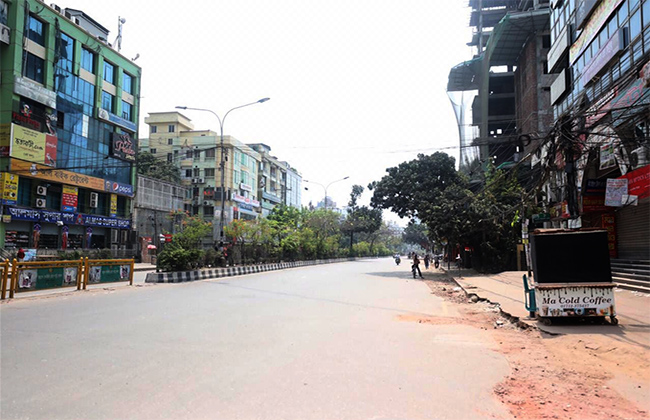
Over the last few months, different sectors of Bangladesh appeared to have been recovering bit by bit following an abrupt but elongated brake on their busy schedules, thanks to Covid-19 induced nationwide lockdown under the official camouflage of ‘general holidays’ last year. But the fresh declaration of putting the country into a weeklong ‘complete lockdown’ from 14 April is deemed to hurt them again, to such an extent that many of the sectors may never be able to heal it.
Lockdown might have been a necessity, especially in the context of an overcrowded Bangladesh, to curb the spread of the highly contagious virus. But for how many days? A week, or two? A month, or a few, or for a complete year? Our experiences from the last year do not let us be relieved of concerns that the coming weeklong ‘complete lockdown’ will not be further extended this time too. And if that is the case, murky implications are definitely awaiting our economy.
In Bangladesh, around 61 million of the total population are employed labour force. And 35 per cent of them are daily-waged based workers, who live on hand to mouth with their scanty daily income – Tk272.2 per capita in the farm sector and Tk361.5 in the non-farm sector, according to a recent study. It means that only a day’s lockdown generates $64.2 million equivalent economic loss considering only the wage loss of daily wage workers, estimates the study published by PLOS ONE – an open access journal of Public Library of Science. Just imagine, how costly the 2020 lockdown meant for all the sectors of the economy – such as transport and communication, community and social services, bank and financial intermediaries, tourism, and wholesale and retail trade etc. Some news reports say the cost might be over 3 per cent of the national GDP (Gross Domestic Product).
To minimise the economic loss, the government declared easy bank credit for different sectors. But that credit hardly reached micro, small and medium enterprises other than a handful of richer sectors, thanks to a malnourished relationship between banks and the informal sector. To also enable the poor and jobless people to feed themselves amid a severe economic hardship, the government provided cash support but that initiative was stained by the looters in politics, under the banner of the ruling party. The consequences were known to all – the government had to stop that programme. We fear a prolonged lockdown may bring, to an unscrupulous section, a scope of being engulfed in endless plundering of public money.
Not only that, an extended lockdown may also impact private domestic and foreign investment, savings and external trade. It may cause massive losses in employment and an increase in poverty. According to the Bangladesh Institute of Development Studies, the pandemic last year led to 13 per cent of people losing work and a decrease in household income, pushing 16.4 million new people under the poverty line, causing serious implications for the country’s socioeconomic and developmental performance in the near and medium term.
A ‘strict’ lockdown is welcome but we must acknowledge that the people do not expect an extended one like the last one, especially in their contexts of waning economic abilities. The government should go for one which will completely shut down all sectors, including restricting public movements, for seven days and then open them. At the same time, it will be unwise to relax the lockdown conditions for some special sectors, for example the industries sector. It might, then, dash the aim of the lockdown going to be enforced on Wednesday.
